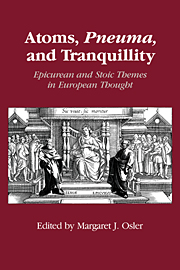Book contents
- Frontmatter
- Contents
- List of contributors
- Acknowledgments
- Introduction
- 1 Ethics and logic in Stoicism
- 2 Medieval connectives, Hellenistic connections: the strange case of propositional logic
- 3 Stoic psychotherapy in the Middle Ages and Renaissance: Petrarch's De remediis
- 4 Alonso de Cartagena and John Calvin as interpreters of Seneca's De clementia
- 5 The Epicurean in Lorenzo Valla's On Pleasure
- 6 Seneca's role in popularizing Epicurus in the sixteenth century
- 7 Stoic contributions to early modern science
- 8 Fortune, fate, and divination: Gassendi's voluntarist theology and the baptism of Epicureanism
- 9 Epicureanism and the creation of a privatist ethic in early seventeenth-century France
- 10 Robert Boyle on Epicurean atheism and atomism
- 11 Stoic and Epicurean doctrines in Newton's system of the world
- 12 Locke, Willis, and the seventeenth-century Epicurean soul
- 13 The Epicurean new way of ideas: Gassendi, Locke, and Berkeley
- 14 The Stoic legacy in the early Scottish Enlightenment
- Index
13 - The Epicurean new way of ideas: Gassendi, Locke, and Berkeley
Published online by Cambridge University Press: 13 November 2009
- Frontmatter
- Contents
- List of contributors
- Acknowledgments
- Introduction
- 1 Ethics and logic in Stoicism
- 2 Medieval connectives, Hellenistic connections: the strange case of propositional logic
- 3 Stoic psychotherapy in the Middle Ages and Renaissance: Petrarch's De remediis
- 4 Alonso de Cartagena and John Calvin as interpreters of Seneca's De clementia
- 5 The Epicurean in Lorenzo Valla's On Pleasure
- 6 Seneca's role in popularizing Epicurus in the sixteenth century
- 7 Stoic contributions to early modern science
- 8 Fortune, fate, and divination: Gassendi's voluntarist theology and the baptism of Epicureanism
- 9 Epicureanism and the creation of a privatist ethic in early seventeenth-century France
- 10 Robert Boyle on Epicurean atheism and atomism
- 11 Stoic and Epicurean doctrines in Newton's system of the world
- 12 Locke, Willis, and the seventeenth-century Epicurean soul
- 13 The Epicurean new way of ideas: Gassendi, Locke, and Berkeley
- 14 The Stoic legacy in the early Scottish Enlightenment
- Index
Summary
The background to seventeenth-century philosophy may be conveniently summarized under two headings. One is the recrudescence of skepticism, resulting from a variety of factors, among them the recovery of classical texts, the Reformation, the rise of national states, and the voyages of discovery. My second heading is another such factor in the rise of skepticism, the emergence of the New Science. The mechanico-mathematical account of the world that was developed in the seventeenth century not only undid the reigning Aristotelian physics but also systematically called into question its whole worldview and thus contributed to the crise pyrrhonienne of the period. Yet the New Science, by its very name, was prima facie incompatible with skepticism, and it is to this opposition that the fundamental philosophical problems of the period relate.
The best-known program developed to deal with the opposition was of course Descartes's. He famously argued that skepticism, consistently applied, refutes itself, and further, that we are thereby led to none other than the New Scientific view of the world. The method of doubt leads us to a metaphysically vindicated clear and distinct idea of extension, the principal attribute of bodies, on which all their other attributes depend. Now, the Cartesian “new way of ideas,” as it was later called, was an exceedingly complex issue, and protracted debate on the issue produced several versions of it among Arnauld, Malebranche, Regis, and others. What they all had in common, however, was the conception of an idea as containing the intelligible or universal element of the material particulars it represented.
- Type
- Chapter
- Information
- Atoms, Pneuma, and TranquillityEpicurean and Stoic Themes in European Thought, pp. 259 - 272Publisher: Cambridge University PressPrint publication year: 1991
- 3
- Cited by



